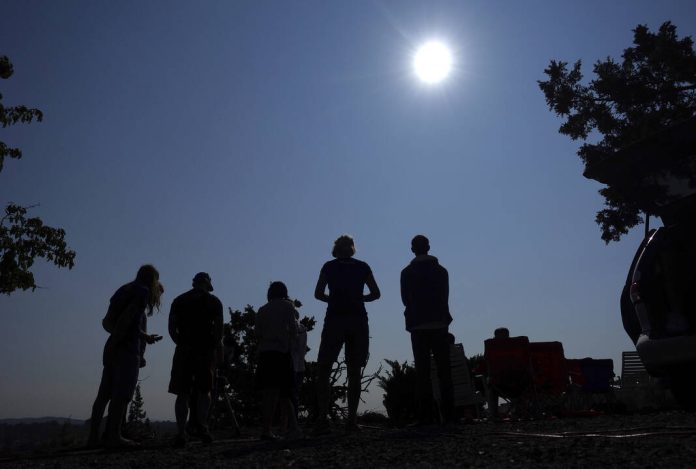
FILE - People gather near Redmond, Ore., to view the sun as it nears a total eclipse by the moon, Monday, Aug. 21, 2017. The April 8, 2024 total solar eclipse in North America first hits land at Mexico’s Pacific coast, cuts diagonally across the U.S. from Texas to Maine and exits in eastern Canada. (AP Photo/Ted S. Warren, File)
If you’re in Vermont, Maine and Canada, you’re in luck. But for the rest of the path of Monday’s total solar eclipse, it could be dicey weather-wise.
Clouds are forecast for much of the eclipse route through the United States with some possible patches of clear skies in some spots, according to the latest forecast from the National Weather Service.
In Indianapolis, where the eclipse is expected to start at and reach totality just after 3 p.m., local forecasters as of late Sunday night were predicting some clouds during the event, with coverage around 40% to 50%. Those clouds are expected to be Cirrus clouds, which are high clouds that typically appear wispy, thin and delicate. No rain is expected.
The National Weather Service is predicting an increase in cloud cover early in the afternoon that will peak at 47% about 2 p.m. and begin to fade, falling to 41% about 3 p.m.
Temperatures in central Indiana are predicted could reach the mid-70s by Monday afternoon.
National forecasters say Northern New England into Canada is still the best bet to witness the eclipse, when the moon blocks out the sun for a few minutes and day turns into night.
Texas is likely to have the heaviest cloud cover. More concerning, the weather service is forecasting severe weather—tornadoes and hail—about the time of the eclipse for parts of Texas, Oklahoma, Arkansas and Louisiana.
The forecast for the eclipse path has been fairly consistent for the past 10 days, said David Roth, a meteorologist with the weather service.
“Things aren’t moving that fast,” he said Sunday.
The path of total darkness stretches from Mexico and Texas through Maine and parts of Canada.
Keep an eye on the clouds
At the Great Lakes Science Center in Cleveland on Sunday, weather service meteorologist Alexa Maines tried to reassure visitors that all was not lost. A warm front was due to bring in clouds Monday morning, but they could clear out by eclipse time. “Cloud cover is one of the trickiest things to forecast,” she said.
Eclipse weather expert Jay Anderson also thinks the eclipse could be visible from Dallas to Columbus through thin, high clouds. “Not the best conditions but tolerable,” Anderson, a retired Canadian meteorologist, said via email.
“South of Dallas, there is a lot of low cloud that will disappoint a lot of eclipse enthusiasts,” he said.
By Associated Press and IBJ Staff




